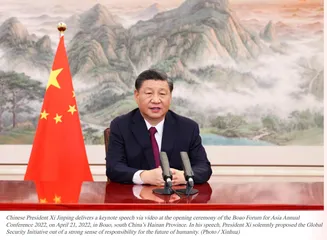Keynote Address by H.E. Liu Jianchao Minister of the International Department of the Central Committee of the Communist Party of China At the Third Wanshou Dialogue on Global Security

Beijing, 5 June 2024
Ladies and Gentlemen,
Colleagues,
I’d like to begin by welcoming all of you to the Third Wanshou Dialogue on Global Security. In today’s turbulent world where changes unseen in a century are unfolding at a faster pace, security anxiety is growing in many countries. Against such a backdrop, it is highly relevant that we gather here in Beijing for a discussion on global security issues and solutions to security challenges.
The widespread security concerns across the world arise from both traditional and non-traditional security threats, as well as potential challenges brought by AI, climate change, new developments in space and the polar regions. What’s more, some countries, under the pretext of minimizing security risks, overstretch the concept of security, blur its lines, hype up security threats, and even build exclusionary groups out of geo-political considerations. This has only increased security risks.
Colleagues,
As an old Chinese saying goes, “Wise people never bet on luck. Nor do they ever betray justice.” Facing the widespread practice of overstretching the security concept, we need to explore and understand its essence, root cause and impact so that right decisions can be made accordingly.
The overstretching of the security concept is in essence an abuse of that concept. In a highly interconnected world with new technological breakthroughs, what security implies and where it applies have gone beyond people’s traditional perception. It means more than political and military security. New changes require new approaches. When pursuing security under the current circumstances, we need to bear in mind that humanity, as a whole, rise and fall together. Thus, countries should not simply put security above everything else, label everything as security-related, or break the balance between security and other issues like development and governance. Still less should countries take exclusionary and confrontational measures to politicize and weaponize trade, technology and cultural issues, or use them as a tool. Such practices cannot address security challenges but only make things worse and further undermine global peace and stability.
The root cause of such practices is an obsession with absolute security. The planet is the only home we share. Countries are like neighbors living in the same global village. No country can achieve unilateral security or absolute security in isolation. Only with common security for all can the world be a truly safe place. No country should place its own security above other countries’ security, put up its own fence at the doorstep of others, undermine others’ security interest, or squeeze others’ security space. Still less should any country shape the security environment of others, or set international rules and build international mechanisms based on its own security standards. This cannot address its own security concerns. Worse still, it will only lead to new conflicts and confrontation, making it more unsafe for the country itself and the world.
The practice of overstretching the concept of security erodes the foundation for common development. Security and development reinforce each other. Thanks to global resources allocation and the division of labor, countries around the world are able to develop together. This not only helps eliminate the breeding ground for risks, enhance the capacity to defend common security, and cement the foundation for sustainable security, but also facilitates interactions among countries, which underpins global security and stability. Those who have abused the concept of security ignore the link between security and development. They see interdependence as a threat, and thus attempt to build a fantasy-land in isolation. The practice of building small yards with high fences, seeking decoupling and cutting of chains undermines the international trade order, segments the global market, and disrupts the global industrial and supply chains. It jeopardizes developing countries’ right to development, harms people’s wellbeing, and makes global development less secure and global security less sustainable.
The practice of overstretching the concept of security makes the global security dilemma more acute. At the national level, blind adoption of policies that aim for excessive security leads to a mismatch and waste of strategic resources, and weakens the country’s capacity to ensure security in key areas. At the international level, it breaks trust and understanding among countries, and fuels estrangement and mutual suspicion. The ensuing escalation of competition and rivalry will turn security dilemma into a self-fulfilling prophecy. In a world trapped in security illusions, intensified bloc confrontation will only hamper the joint efforts to address global security challenges and increase the odds of confrontation and conflicts. It will disrupt the security order and make the world shrouded in the dark clouds of wars.
Colleagues,
A right strategic perception is the precondition to solve security issues. History has shown that no country can stay immune to global crises, and humanity share weal and woe together. Bearing in mind the interests of China and the world, and the wellbeing of all, President Xi Jinping has put forward the Global Security Initiative which perfectly embodies the vision of a community with a shared future for mankind. It calls for a new security approach based on the right perception, and sets the course for global security governance. To implement the initiative, we need to do the following.